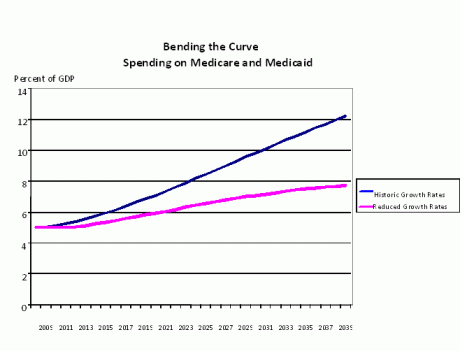“Bend the Curve”, a concrete healthcare proposal from Brookings
September 3, 2009
The President and Peter Orszag, Director of the OMB, have repeatedly noted “that reducing the growth rate of health care costs is the single most important fiscal issue we face as a country.” …and that we need legislation that will “Bend the Curve.” Ten extraordinary healthcare experts assembled by the Brookings Institute, Engelberg Center for Health Care Reform, released their 10 page report today, “Bending the Curve: Effective Steps to Address Long-Term Health Care Spending Growth.” The report includes concrete proposals including regional health insurance exchanges, accountable care organizations, and practical tort reform, to reduce the growth of our national health care costs. When congress reconvenes on this issue, could “BEND THE CURVE!” become the chamber echo that inspires new legislation? …legislation that addresses the issues boiling over in McAllen, Texas? Reading the full Brookings report “Bending the Curve” gave me hope.
Ten extraordinary healthcare experts assembled by the Brookings Institute, Engelberg Center for Health Care Reform, released their 10 page report today, “Bending the Curve: Effective Steps to Address Long-Term Health Care Spending Growth.” The report includes concrete proposals including regional health insurance exchanges, accountable care organizations, and practical tort reform, to reduce the growth of our national health care costs. When congress reconvenes on this issue, could “BEND THE CURVE!” become the chamber echo that inspires new legislation? …legislation that addresses the issues boiling over in McAllen, Texas? Reading the full Brookings report “Bending the Curve” gave me hope.
Whenever we discuss about how to control the healthcare cost, no one is willing to point out the incomes of our healthcare providers as a root cause. I have a bad dental problem. My dentist promises to fix the problem at an expense of $7,000. I recently visited China. During the visit, I asked a Chinese dentist to estimate how much it costs him to fix my dental problem. Guess what? His estimate was $700.
The full Brookings report addresses physician reimbursement in several ways. …primarily by suggesting that specialist reimbursement is reduced while primary care reimbursement is increased. …but also by suggesting tort reform that could reduce the liability insurance costs of the American physician, costs not shared by a physician or dentist in China. The full Brookings report can be down loaded as a PDF by clicking on the last link in my blog “Bending the Curve”.
The suggestions of reducing specialist reimbursement and increasing primary care reimbursement will do little to the total cost of healthcare delivery. Reducing the liability insurance costs may add to the incomes of doctors. It will not directly contribute to the reduction of the overall healthcare cost.
The two examples provided in my reply were two of more than 50 proposed steps to reduce the growth of our nation’s healthcare costs. For those who have an interest in the suggestions from the Brookings Institute, their report is available at: http://www.brookings.edu/~/media/Files/rc/reports/2009/0826_btc/0826_btc_fullreport.pdf
The real issue with compensation is there is no competition in the market. Introduce real competition in the health care industry and the market will decide what is fair compensation. As it stands no the federal government and insurance companies determine level of payment regardless of outcome.
Doesn’t the proposed adoption of programs that incentivize Accountable Care Organizations for cost reduction and improved quality or outcomes address such issues? If an ACO has a financial incentive to provide improved outcomes and the member has a financial incentive to choose a physician in an ACO with enhanced performance, then aren’t the incentives/compensation aligned to meet the goal of improved outcomes at lower costs? My post on the ACO established by Hill Physicians, Catholic Healthcare West, and Blue Shield might serve as an example.
It is difficult to introduce competition in the marketplace in healthcare. The comparative information delivered to patients is either hard to understand or contains flaws in measurement. That is why I predict that the Pay for Performance programs experiemented by insurance companies and Medicare will not succeed because of the inability to measure the true quality and cost of care delivery.
Thanks Steve,
Trying to make 18% of the GDP something less is not doubt a daunting and multifaceted effort.
Years ago I explained that it seemed everyone was looking for the “silver bullet” well, there was never just one. It is more like tens of thousands “silver bbs.” From moving from procedure based payments (activity) to outcome based (population) Global Episodes payments may be a bridging step.
Getting the population to think longitudinally i.e. I am not in the best shape, but I will start tomorrow my diet – or better yet exercise program. We humans have a weakness for food and vice.
Oof, it is a long, long journey and we have started with small steps.